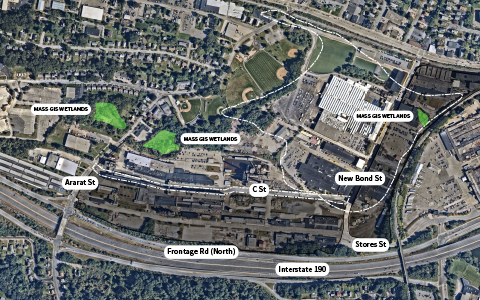
Transform one million square feet of underused industrial space and reconnect it to the adjacent neighborhood. This is the ambitious goal of the nonprofit Worcester Business Development Corporation (WBDC)—a key player in making Worcester an innovation hub and New England’s fastest-growing city. After receiving 51 acres of largely vacant manufacturing land in Worcester’s Greendale neighborhood along Interstate 190, the WBCD and the City of Worcester envision unleashing the far-reaching redevelopment potential of these parcels.
To explore possibilities for breathing life back into this large, well-positioned chunk of real estate, the WBDC sought a consultation with another nonprofit committed to creating better places: the Urban Land Institute (ULI). ULI Boston/New England members form volunteer Technical Assistance Panels (TAPs) that pool their collective experience for one or two days to assess communities’ challenging development projects and give workable recommendations for advancing them. Municipalities credit the TAP process with better equipping them to achieve their land use goals, an independent study by Rivera Consulting has found.
A multidisciplinary group of 10 professionals, including Worcester-based VHB Site/Civil Designer Derek Masionis, donated their time to an intensive 12-hour Worcester WBDC Greendale TAP on June 20. Their full day began with the panelists—architects, engineers, developers, a transportation planner, a real estate attorney, and a construction professional—touring the study area. Then they sat down with Greendale residents, business owners, and City officials to learn their needs and hopes for the site.
In design charrettes held that afternoon, ideas flowed as the panelists creatively assessed the Greendale parcels’ redevelopment potential based on the information they gathered. The outcome of these highly focused, productive meetings was a presentation that framed the site’s opportunities and challenges and outlined revitalization strategies the panelists formulated in light of WBDC’s three key questions for the TAP:
- Land Use and Zoning—What is the highest and best use for the area?
- Transportation and Infrastructure—What infrastructure must be implemented to assist with the area’s overall vitality?
- Market Feasibility—What is the vision for this property, with a focus on advanced manufacturing, green technology, and clean technology?
WBDC staff and stakeholders gathered that evening to hear the panelists’ presentation and contribute to a lively, informative Q&A session. ULI recently released the final deliverable for the Greendale TAP, a 26-page report that further fleshes out and formalizes the panelists’ work.
From his perspective as a Greendale TAP participant, Derek voiced praise for the effort. “With this site’s complexities, we had a lot to solve for in a very compressed timeframe: reestablishing connections for all travel modes with the surrounding neighborhood while maintaining safety for the abutting charter school; addressing flooding issues in several areas; and finding ways to honor the history of the manufacturing company—beloved by the local community—that had roots here dating back to the late 19th century. The Greendale TAP was an outstanding example of what’s possible when people with a variety of experience come together in a spirit of collaboration.”
To learn more about the TAP process and how VHB helps our clients navigate complex land development challenges, contact Derek or Brittany Gesner, PE, Director of Land Development, Worcester.
